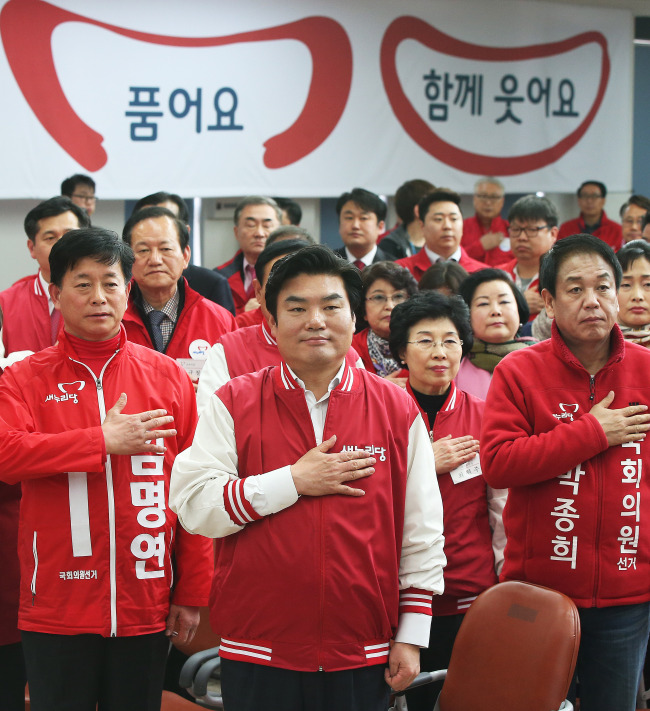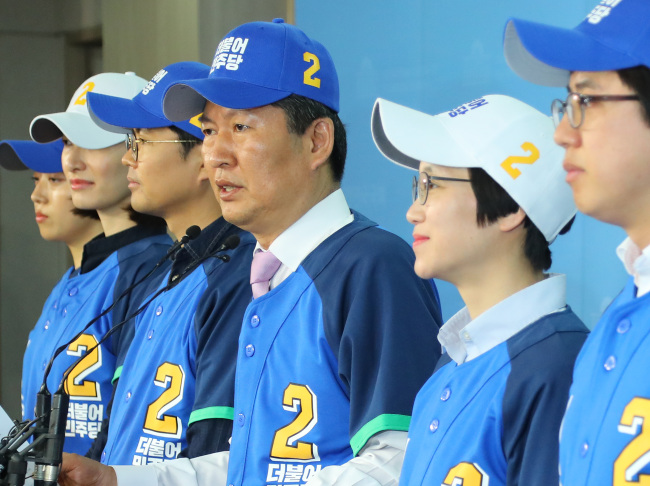Kim Hyun-jin, a 34-year-old living in Seoul, finds himself at a loss as to who to vote for at the April 13 election to constitute the next four years of the National Assembly.
“My first voting experience was the 2002 presidential election, which ended in the dramatic victory of the late President Roh Moo-hyun, and I have ever since taken part in every state election, even in the most disappointing situations,” Kim said.

Saenuri Party members including floor leader Rep. Won Yoo-chul (front, center) attend a campaign launch ceremony for Gyeonggi Province at the party office in Suwon on Tuesday.
“But this year, frankly speaking, I have been so skeptical about voting that I even considered casting a void ballot.”
Kim has long been a firm supporter of the now-opposition camp which is currently represented by The Minjoo Party of Korea, despite successive changes of its name and identity.
“Though I didn‘t agree with every decision made by the Minjoo camp, I believed that the conservative-led politics needs to be challenged and changed,“ he said.

Members of the “THE CUT” team, comprised of former preliminary candidates including Rep. Jung Cheong-rae who have been dropped from nominations, hold a press conference at the National Assembly on Tuesday declaring their support for the party’s election win. (Yonhap)
“But looking back on parliamentary history, I am no longer sure that the current opposition is a valid alternative after all.”
Kim is among numerous young voters in their 20s and 30s who remain undecided on who to show political support for.
“Over recent years, the public’s interest in elections has visibly faded, while its aversion has soared, which means that the voter turnout will continue its current downtrend,” said Bae Jong-chan, senior analyst at local pollster Research & Research.
The official thus predicted that voter participation for this year’s general election is likely to dip lower than 50 percent.
Other experts choose to look on the bright side.
“The early voting system may pull up the turnout to a certain extent by allowing passive voters to head to the polls,” said Yoon Hee-woong, senior researcher at Opinion Live.
Starting from this year’s elections, the National Election Commission is to adopt an early voting system, enabling voters to cast their ballot in advance, within a week prior to the voting day.
However, few disagree that the public is showing a growing level of fatigue toward the election or politics in general.
“The factional feuds that marred the recent candidate nominations rekindled the public’s chronic fatigue toward politics” said Lee Nae-young, professor of politics at Korea University.
“But the rise of new alternatives, including a centrist third party, has also expanded the range of selection for swing voters with no specific party affiliation.”
It is still uncertain whether the undecided swing voters and disappointed party supporters will turn to the new centrist People’s Party, but the two leading parties certainly lost some ground over the past weeks.
According to a survey last week by local pollster Realmeter on 2,522 voters nationwide, the ruling Saenuri Party and the Minjoo Party’s general ratings stood at 38.3 percent and 24.9 percent, down 3.2-3.4 percentage points respectively.
The greater impact was that both parties saw a decline in areas considered their unfaltering strongholds. Saenuri lost 14 percentage points in Daegu and North Gyeongsang Province, while the Minjoo Party lost 6.1 percentage points in Gwangju and the Jeolla Provinces.
What divided the solid conservative voter pool was the clash between non-mainstreamers and those close to President Park Geun-hye, which led to defections such as that of high-profile Daegu lawmaker Rep. Yoo Seong-min. Putting the Minjoo Party at peril has been the appearance of the People’s Party and the consequent defection of several Jeolla-based members.
Though the immediate impact was more conspicuous for the conservative pool, observers noted that it is the opposition camp that may suffer a greater blow from voter apathy.
“The unchanging rule is that the higher the voter turnout, the more beneficial for the opposition side,” said Yoon.
In line with such a theory, the ruling Uri Party had won 41.99 percent support in the 2004 general election, beating the then-opposition Grand National Party, which is now the Saenuri Party. The voter turnout at the time exceeded 60 percent, reflecting the public‘s resentment toward the GNP’s impeachment of then-President Roh.
In contrast, in the following elections in 2008, the turnout stood at a mere 46.1 percent, and the conservative camp succeeded in securing a parliamentary majority.
By Bae Hyun-jung (
tellme@heraldcorp.com)
South Korea will elect new National Assembly members in a general election on April 13. The Korea Herald is publishing a series of articles on candidate agendas, election trends and notable runners leading up to the race. This is the tenth installment. –Ed



![[Herald Interview] 'Amid aging population, Korea to invite more young professionals from overseas'](http://res.heraldm.com/phpwas/restmb_idxmake.php?idx=645&simg=/content/image/2024/04/24/20240424050844_0.jpg&u=20240424200058)



